Personal Loans vs. Credit Cards: Which Should You Choose? When you need to finance a purchase, cover an emergency expense, or consolidate debt, two common options come to mind: personal loans and credit cards. Both offer access to funds, but they differ significantly in terms of interest rates, repayment terms, and suitability for various financial situations. Choosing the right option can save you money and stress in the long run. In this comprehensive 1500-word guide, we’ll break down the key differences between personal loans and credit cards, explore their pros and cons, and help you decide which is best for your needs.
What Are Personal Loans?
A personal loan is a type of unsecured loan offered by banks, credit unions, or online lenders. You borrow a fixed amount of money upfront and repay it in equal monthly installments over a set period, typically 1 to 7 years. Personal loans are versatile and can be used for various purposes, such as debt consolidation, home renovations, medical expenses, or major purchases.
Key Features of Personal Loans
- Fixed Interest Rates: Most personal loans come with a fixed interest rate, meaning your monthly payments remain consistent throughout the loan term.
- Loan Amount: You can borrow anywhere from $1,000 to $50,000 or more, depending on your credit score and lender.
- Repayment Term: Fixed terms make budgeting easier, as you know exactly when the loan will be paid off.
- No Collateral: Personal loans are typically unsecured, so you don’t need to put up assets like a car or home as collateral.
What Are Credit Cards?
A credit card is a revolving line of credit that allows you to borrow money up to a predetermined limit. You can use it for everyday purchases, online shopping, or even cash advances. Unlike personal loans, credit cards don’t have a fixed repayment schedule—you can pay off the balance in full each month or make minimum payments and carry a balance.
Key Features of Credit Cards
- Variable Interest Rates: Credit card interest rates are often variable and significantly higher than personal loans, especially if you carry a balance.
- Credit Limit: Your credit limit depends on your creditworthiness, typically ranging from a few hundred to tens of thousands of dollars.
- Flexible Repayment: You can pay as little as the minimum payment each month, but this can lead to accumulating interest and long-term debt.
- Rewards and Perks: Many credit cards offer cashback, travel points, or other rewards, making them attractive for regular spending.
Personal Loans vs. Credit Cards: A Side-by-Side Comparison
To help you decide, let’s compare personal loans and credit cards across several key factors:
| Factor | Personal Loans | Credit Cards |
|---|---|---|
| Interest Rates | Fixed, typically 6%–36% APR | Variable, often 15%–30%+ APR |
| Repayment Structure | Fixed monthly payments over 1–7 years | Flexible, minimum payments or pay in full |
| Loan/Credit Amount | $1,000–$50,000+ | Up to credit limit (varies widely) |
| Fees | Origination fees (1%–8%), prepayment penalties | Annual fees, late fees, balance transfer fees |
| Best For | Large, one-time expenses, debt consolidation | Small, recurring purchases, building credit |
Pros and Cons of Personal Loans
Advantages of Personal Loans
- Lower Interest Rates: Personal loans often have lower APRs than credit cards, especially for borrowers with good credit.
- Predictable Payments: Fixed monthly payments make budgeting easier and help you avoid surprises.
- Debt Consolidation: Personal loans are ideal for consolidating high-interest credit card debt into a single, lower-rate payment.
- No Risk to Assets: As unsecured loans, they don’t require collateral, reducing risk to your property.
Disadvantages of Personal Loans
- Origination Fees: Some lenders charge upfront fees, which can increase the cost of borrowing.
- Strict Eligibility: You’ll need a good credit score and stable income to qualify for the best rates.
- Inflexible Terms: Once you take out a personal loan, you’re committed to the repayment schedule, with no option to pause payments.
- One-Time Funding: Unlike credit cards, you can’t borrow additional funds without applying for a new loan.
Pros and Cons of Credit Cards
Advantages of Credit Cards
- Convenience: Credit cards are widely accepted and easy to use for everyday purchases or emergencies.
- Rewards Programs: Many cards offer cashback, travel miles, or points, which can add value if you pay off the balance monthly.
- Build Credit: Responsible credit card use can improve your credit score over time.
- Grace Period: Most credit cards offer a grace period where no interest is charged if you pay the balance in full each month.
Disadvantages of Credit Cards
- High Interest Rates: Carrying a balance can lead to costly interest charges, often exceeding 20% APR.
- Debt Trap: Minimum payments can make it easy to accumulate debt, leading to a cycle of high interest.
- Fees: Annual fees, late payment fees, and cash advance fees can add up quickly.
- Credit Limit Restrictions: Your spending is capped by your credit limit, which may not be enough for large expenses.
When to Choose a Personal Loan
Personal loans are the better choice in the following scenarios:
- Large, One-Time Expenses: If you’re financing a major purchase like a wedding, home renovation, or medical procedure, a personal loan provides a lump sum with lower interest rates than credit cards.
- Debt Consolidation: If you have multiple high-interest credit card balances, consolidating them into a personal loan can simplify payments and reduce interest costs.
- Fixed Budget Needs: If you prefer predictable monthly payments and a clear payoff date, a personal loan aligns with structured financial planning.
- Better Credit Score: If you have good to excellent credit, you’re likely to qualify for a low-rate personal loan, making it more cost-effective than a credit card.
When to Choose a Credit Card
Credit cards are more suitable in these situations:
- Small, Recurring Purchases: For everyday expenses like groceries, gas, or dining, credit cards are convenient and often come with rewards.
- Short-Term Financing: If you can pay off the balance in full each month, you can avoid interest entirely and take advantage of rewards.
- Building Credit: For those with limited or poor credit, responsible credit card use can help establish or improve your credit score.
- Emergencies: Credit cards are a quick and flexible option for unexpected expenses, especially if you don’t have time to apply for a loan.
How to Decide: Key Questions to Ask Yourself
To choose between a personal loan and a credit card, consider these questions:
- How Much Money Do I Need? If you need a large sum, a personal loan is likely the better option. For smaller amounts, a credit card may suffice.
- Can I Pay It Off Quickly? If you can pay off the balance within a month or two, a credit card with a 0% introductory APR or grace period is ideal. For longer repayment, a personal loan is more affordable.
- What’s My Credit Score? A good credit score can unlock low-rate personal loans, while credit cards may be easier to qualify for with fair credit.
- Do I Need Flexibility? If you want the ability to borrow as needed, a credit card’s revolving credit line is more flexible than a personal loan’s fixed amount.
- What Are the Total Costs? Compare interest rates, fees, and repayment terms to determine which option is more cost-effective over time.
Tips for Using Personal Loans and Credit Cards Wisely
Whether you choose a personal loan or a credit card, follow these tips to manage your borrowing responsibly:
- Compare Lenders: Shop around for the best interest rates and terms. Use online tools to compare personal loan offers or credit card promotions.
- Read the Fine Print: Understand fees, penalties, and terms before signing up for a loan or card.
- Make Timely Payments: Late payments can hurt your credit score and lead to additional fees.
- Avoid Overborrowing: Only borrow what you can afford to repay, and stick to a budget to avoid financial strain.
- Monitor Your Credit: Regularly check your credit report to ensure your borrowing habits are positively impacting your score.
Conclusion: Personal Loan or Credit Card?
The choice between a personal loan and a credit card depends on your financial needs, repayment ability, and long-term goals. Personal loans are best for large, one-time expenses or debt consolidation, offering lower interest rates and predictable payments. Credit cards, on the other hand, are ideal for smaller, recurring purchases or short-term financing, especially if you can pay off the balance monthly to avoid interest.
By understanding the pros, cons, and use cases of each option, you can make an informed decision that aligns with your financial situation. Always compare rates, consider your credit score, and prioritize responsible borrowing to achieve your financial goals without falling into debt.




